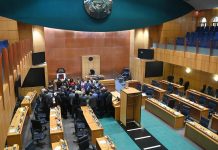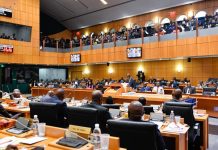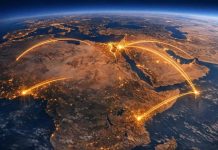Africa-Press – Botswana. In the event that South Africa’s Economic Freedom Front wins next year’s general election, one of the first thing that would-be President Julius Malema would immediately to is punish Botswana by “isolating” it from the rest of the African continent.
As South Africa’s second largest political party, EFF is very popular with black youth. The latter are a significant voter constituency and if they turn out in large enough numbers at next year’s general election, can end the 30-year rule of the African National Congress (ANC). As detailed in the manifesto, an EFF government will “will work towards the African isolation of Botswana, which has been home to an imperialist military base, and fight for progressive internal reforms within Botswana which should involve the people of Botswana. The EFF government will work towards the rejection of the Africa Command Centre, a military programme of the United States based in Botswana.”
However, if he is consistent in applying his “African isolation” standard as punishment for cooperating with the US, Malema would have to isolate many more African countries.
The US has at least three forward operating sites in Africa, one in Djibouti, another (a logistics hub) on the British-owned Ascension Island in the south Atlantic Ocean and the third – whose presence it denies, in Niger. It has a long-time drone base in Tunisia and other bases in Kenya, Somalia, Libya and Ghana. It is possible that there could be many more.
Malema has never explained why a future EFF government would single out Botswana for punishment at the exclusion of all other African countries that also host US military bases.
Somebody else has joined Malema campaign against the airbase: ANC Secretary General, Fikile Mbalula, who like Malema, has also served a stint as president of the party’s youth league. Addressing a party meeting in Cape Town two months ago, Mbalula essentially reiterated what his erstwhile comrade has been saying since 2011.
“We don’t subscribe to regime change policy, that governments must be changed through undemocratic means, through military power. America can move right from Botswana, because they are here in Botswana, they move in the afternoon by dinner everything will be sorted,” he said.
Interestingly, the Defense Logistics Agency (DLA), a combat support agency in the US’s Department of Defense, has (unwittingly) made a quite interesting revelation. The Agency, which manages an end-to-end global defence supply chain and has more than 26 000 civilian and military personnel throughout the world, maintains marine gas and oil bunker locations in some African countries. In 2013, there were 10 such locations in eight countries that the Agency wouldn’t reveal when asked to do so by the press. However, basic investigative journalism by a US publication called Mother Jones revealed that South Africa was among countries that hosted a DLA fuel bunker.
The publication obtained military contracting documents that listed key fuel bunker locations in Douala, Cameroon; Mindelo, Cape Verde; Abidjan, Cote D’Ivoire; Port Gentil, Gabon; Sekondi, Ghana; Mombasa, Kenya; Port Luis, Mauritius; Walvis Bay, Namibia; Lagos, Nigeria; Port Victoria, Seychelles; Durban, South Africa; and Dar Es Salaam, Tanzania. That adds to the list of countries that a future EFF government would have to isolate if such action is based on principle.
To be clear, it is unclear whether South Africa still hosts that facility but it is interesting to observe that at the same that at the same time that Malema (then president of the ANC Youth League) was raising hell about Botswana hosting a US base, South Africa was itself hosting a combat-support fuel bunker that enabled the US to “deliver readiness and lethality” – as DLA’s mission states. The bunker is/was itself a military base because it supports/supported military operations.
South Africa also figures in this matter in another very ironic context. In 2019, during the presidency of Vladimir Putin, two nuclear bombers from Russia landed at the Waterkloof Air Base in Tshwane, the country’s administrative capital. The Tupolev Tu-160 fighter jets, which were first nuclear bombers to ever land in Africa, are capable of launching nuclear missiles.
In fairness to Malema and Mbalula, America is a war-monger and they have a valid reason to be fearful of what its military presence in Botswana portends for South Africa’s national security. However, Putin – who launched an unprovoked attack on Ukraine last year, is also a war-monger who has been known to act in unpredictably. The presence of Putin’s nuclear bombers in South Africa posed the same threat to regional security as that supposedly posed by an American base in Botswana.
The inconsistency in Malema’s reasoning aside, his threat to isolate Botswana is nothing more than empty and impractical rabble-rousing. For starters, the (white) people who run South Africa wouldn’t ever allow him to do that because they would lose hundreds of billions of pula that they have invested in Botswana. South Africa has vast commercial holdings in Botswana – which partly explains why the government of President Cyril Ramaphosa is worried about the fight between former president Ian Khama and President Mokgweetsi Masisi sparking some kind of civil strife. If Game City shopping mall literally catches fire, South Africa’s financial loss would be much bigger than Botswana’s.
Botswana is ranked South Africa’s seventh largest export market and in 2021, South Africa’s exports to Botswana were R64.4 billion. Beginning in 2000 to 2020, South Africa’s exports to Botswana increased at an annualised rate of 4.24 percent. According to the UN COMTRADE database on international trade, South Africa Exports to Botswana was US$4.69 Billion during 2022. The May 7, 2021 issue of Farmer’s Weekly quotes Thomas Harvey, Absa’s head of AgriBusiness in Botswana as saying that South Africa and Botswana are dependent on each other to a greater or lesser extent in the supply and demand chains of their agriculture sectors. “Botswana is a landlocked, semi-desert country that is not self-sufficient in food, and depends on imports, mainly from South Africa, to ensure its food security. South Africa, on the other hand, needs the Botswana market to ensure offtake for some of its exports.” South Africa Exports to Botswana was US$4.69 Billion during 2022, according to the United Nations COMTRADE database on international trade. Most of the luxury tourists in the Okavango Delta are owned by South Africans.
As president, Malema would find that his hands are tied and if does indeed punish Botswana in the manner he stated, the South African businesspeople who punish him by deposing him.
For More News And Analysis About Botswana Follow Africa-Press






